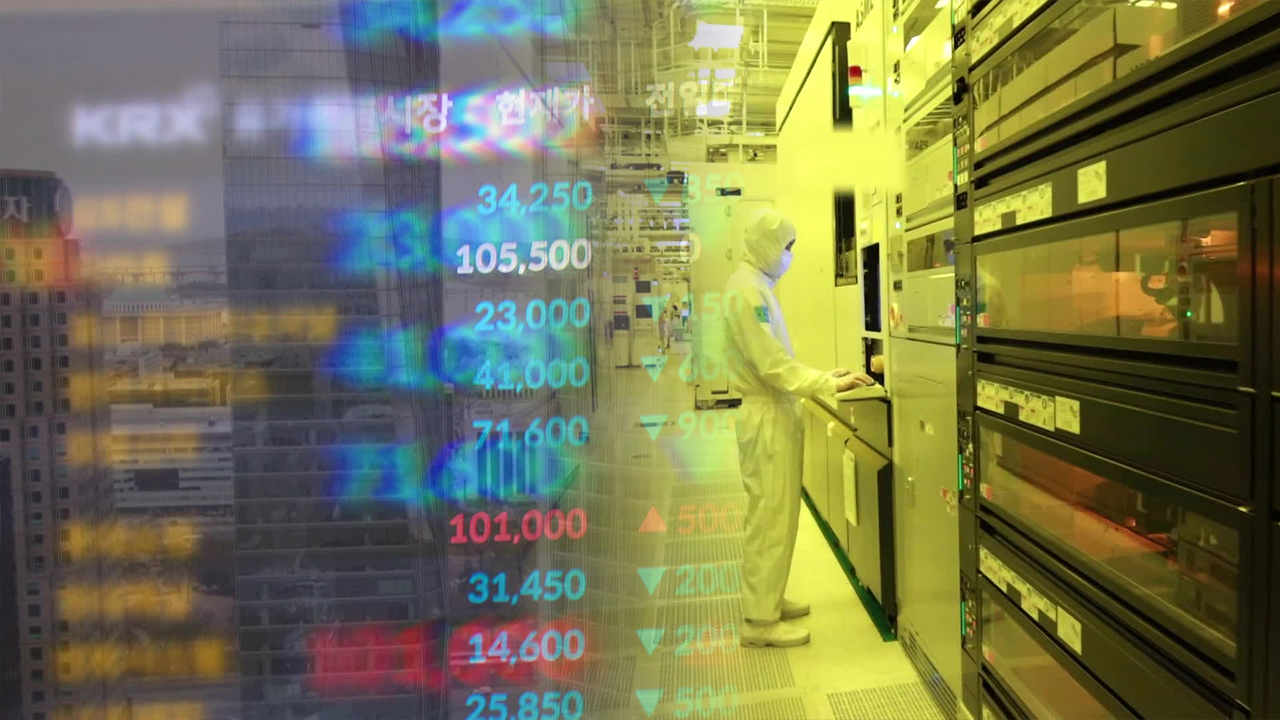Corporate Value-up Program controversy
입력 2025.01.18 (00:20)
읽어주기 기능은 크롬기반의
브라우저에서만 사용하실 수 있습니다.
[Anchor]
One year ago today (1.17), an unfamiliar term emerged at the forefront of policy.
It was a neologism combining the English words 'value' and 'up'.
[Kim Joo-hyun/Former Chairman of the Financial Services Commission/Jan. 17, 2024: "One key aspect of the Korea Discount is that it’s important for companies themselves to work hard to increase their own value."]
The corporate value-up program.
The goal was to increase the corporate value of listed companies, raise stock prices, and help shareholders who bought stocks make money.
Follow-up measures followed.
Value-up disclosures, value-up indices, value-up ETFs.
However, as investors are well aware, there were no significant effects.
First, let's look at the one-year performance of the value-up initiative, analyzed by reporter Song Su-jin.
[Report]
A foundry that produces semiconductors designed by other companies.
TSMC and Samsung Electronics are representative companies, and the second-largest company in Korea is 'DB HiTek.'
It gained attention for mass-producing 8-inch semiconductors, but its stock price has halved in the past year.
The allegations of embezzlement and breach of trust against the largest shareholder turned into a legal battle, which became a negative factor, yet it was included in the 'value-up index' that gathered shareholder-friendly companies.
[Lee Sang-mok/DB HiTek Minority Shareholder: "From a value-up perspective, it seems strange that a company in such a poor situation was included in the value-up index."]
Companies embroiled in extreme management conflicts, such as Korea Zinc, and companies accused of minority shareholder harm, like Doosan Bobcat, were also included in the same index.
Setting aside the controversies, was the return high?
Currently, there are a total of 12 'value-up ETFs.'
From November last year to Jan. 14 this year, the average return was -1.4%.
Only one place made a profit.
This is a press release from the Korea Exchange summarizing the value-up year.
It emphasizes that companies with 'value-up disclosures' saw an average return of 4.9% last year.
Looking at individual stocks.
Six out of ten had negative returns.
This means that if you had bought individual value-up stocks, it would have been easier to incur losses.
[Park Joo-geun/CEO of a corporate analysis firm: "Unless issues like transparency in governance are resolved, it’s impossible to actually increase value, but the value-up policy was still implemented."]
If stock prices were sluggish, did dividends at least increase?
In 2023, the average KOSPI dividend was about 38 when net profit was 100, but last year, companies with 'value-up disclosures' returned only about 31 to shareholders.
In the past year, stock selection, stock price increases, and dividend increases were all unsatisfactory.
This is the background of the controversy over the so-called value-up program.
This is KBS News, Song Su-jin.
One year ago today (1.17), an unfamiliar term emerged at the forefront of policy.
It was a neologism combining the English words 'value' and 'up'.
[Kim Joo-hyun/Former Chairman of the Financial Services Commission/Jan. 17, 2024: "One key aspect of the Korea Discount is that it’s important for companies themselves to work hard to increase their own value."]
The corporate value-up program.
The goal was to increase the corporate value of listed companies, raise stock prices, and help shareholders who bought stocks make money.
Follow-up measures followed.
Value-up disclosures, value-up indices, value-up ETFs.
However, as investors are well aware, there were no significant effects.
First, let's look at the one-year performance of the value-up initiative, analyzed by reporter Song Su-jin.
[Report]
A foundry that produces semiconductors designed by other companies.
TSMC and Samsung Electronics are representative companies, and the second-largest company in Korea is 'DB HiTek.'
It gained attention for mass-producing 8-inch semiconductors, but its stock price has halved in the past year.
The allegations of embezzlement and breach of trust against the largest shareholder turned into a legal battle, which became a negative factor, yet it was included in the 'value-up index' that gathered shareholder-friendly companies.
[Lee Sang-mok/DB HiTek Minority Shareholder: "From a value-up perspective, it seems strange that a company in such a poor situation was included in the value-up index."]
Companies embroiled in extreme management conflicts, such as Korea Zinc, and companies accused of minority shareholder harm, like Doosan Bobcat, were also included in the same index.
Setting aside the controversies, was the return high?
Currently, there are a total of 12 'value-up ETFs.'
From November last year to Jan. 14 this year, the average return was -1.4%.
Only one place made a profit.
This is a press release from the Korea Exchange summarizing the value-up year.
It emphasizes that companies with 'value-up disclosures' saw an average return of 4.9% last year.
Looking at individual stocks.
Six out of ten had negative returns.
This means that if you had bought individual value-up stocks, it would have been easier to incur losses.
[Park Joo-geun/CEO of a corporate analysis firm: "Unless issues like transparency in governance are resolved, it’s impossible to actually increase value, but the value-up policy was still implemented."]
If stock prices were sluggish, did dividends at least increase?
In 2023, the average KOSPI dividend was about 38 when net profit was 100, but last year, companies with 'value-up disclosures' returned only about 31 to shareholders.
In the past year, stock selection, stock price increases, and dividend increases were all unsatisfactory.
This is the background of the controversy over the so-called value-up program.
This is KBS News, Song Su-jin.
■ 제보하기
▷ 카카오톡 : 'KBS제보' 검색, 채널 추가
▷ 전화 : 02-781-1234, 4444
▷ 이메일 : kbs1234@kbs.co.kr
▷ 유튜브, 네이버, 카카오에서도 KBS뉴스를 구독해주세요!
- Corporate Value-up Program controversy
-
- 입력 2025-01-18 00:20:26

[Anchor]
One year ago today (1.17), an unfamiliar term emerged at the forefront of policy.
It was a neologism combining the English words 'value' and 'up'.
[Kim Joo-hyun/Former Chairman of the Financial Services Commission/Jan. 17, 2024: "One key aspect of the Korea Discount is that it’s important for companies themselves to work hard to increase their own value."]
The corporate value-up program.
The goal was to increase the corporate value of listed companies, raise stock prices, and help shareholders who bought stocks make money.
Follow-up measures followed.
Value-up disclosures, value-up indices, value-up ETFs.
However, as investors are well aware, there were no significant effects.
First, let's look at the one-year performance of the value-up initiative, analyzed by reporter Song Su-jin.
[Report]
A foundry that produces semiconductors designed by other companies.
TSMC and Samsung Electronics are representative companies, and the second-largest company in Korea is 'DB HiTek.'
It gained attention for mass-producing 8-inch semiconductors, but its stock price has halved in the past year.
The allegations of embezzlement and breach of trust against the largest shareholder turned into a legal battle, which became a negative factor, yet it was included in the 'value-up index' that gathered shareholder-friendly companies.
[Lee Sang-mok/DB HiTek Minority Shareholder: "From a value-up perspective, it seems strange that a company in such a poor situation was included in the value-up index."]
Companies embroiled in extreme management conflicts, such as Korea Zinc, and companies accused of minority shareholder harm, like Doosan Bobcat, were also included in the same index.
Setting aside the controversies, was the return high?
Currently, there are a total of 12 'value-up ETFs.'
From November last year to Jan. 14 this year, the average return was -1.4%.
Only one place made a profit.
This is a press release from the Korea Exchange summarizing the value-up year.
It emphasizes that companies with 'value-up disclosures' saw an average return of 4.9% last year.
Looking at individual stocks.
Six out of ten had negative returns.
This means that if you had bought individual value-up stocks, it would have been easier to incur losses.
[Park Joo-geun/CEO of a corporate analysis firm: "Unless issues like transparency in governance are resolved, it’s impossible to actually increase value, but the value-up policy was still implemented."]
If stock prices were sluggish, did dividends at least increase?
In 2023, the average KOSPI dividend was about 38 when net profit was 100, but last year, companies with 'value-up disclosures' returned only about 31 to shareholders.
In the past year, stock selection, stock price increases, and dividend increases were all unsatisfactory.
This is the background of the controversy over the so-called value-up program.
This is KBS News, Song Su-jin.
One year ago today (1.17), an unfamiliar term emerged at the forefront of policy.
It was a neologism combining the English words 'value' and 'up'.
[Kim Joo-hyun/Former Chairman of the Financial Services Commission/Jan. 17, 2024: "One key aspect of the Korea Discount is that it’s important for companies themselves to work hard to increase their own value."]
The corporate value-up program.
The goal was to increase the corporate value of listed companies, raise stock prices, and help shareholders who bought stocks make money.
Follow-up measures followed.
Value-up disclosures, value-up indices, value-up ETFs.
However, as investors are well aware, there were no significant effects.
First, let's look at the one-year performance of the value-up initiative, analyzed by reporter Song Su-jin.
[Report]
A foundry that produces semiconductors designed by other companies.
TSMC and Samsung Electronics are representative companies, and the second-largest company in Korea is 'DB HiTek.'
It gained attention for mass-producing 8-inch semiconductors, but its stock price has halved in the past year.
The allegations of embezzlement and breach of trust against the largest shareholder turned into a legal battle, which became a negative factor, yet it was included in the 'value-up index' that gathered shareholder-friendly companies.
[Lee Sang-mok/DB HiTek Minority Shareholder: "From a value-up perspective, it seems strange that a company in such a poor situation was included in the value-up index."]
Companies embroiled in extreme management conflicts, such as Korea Zinc, and companies accused of minority shareholder harm, like Doosan Bobcat, were also included in the same index.
Setting aside the controversies, was the return high?
Currently, there are a total of 12 'value-up ETFs.'
From November last year to Jan. 14 this year, the average return was -1.4%.
Only one place made a profit.
This is a press release from the Korea Exchange summarizing the value-up year.
It emphasizes that companies with 'value-up disclosures' saw an average return of 4.9% last year.
Looking at individual stocks.
Six out of ten had negative returns.
This means that if you had bought individual value-up stocks, it would have been easier to incur losses.
[Park Joo-geun/CEO of a corporate analysis firm: "Unless issues like transparency in governance are resolved, it’s impossible to actually increase value, but the value-up policy was still implemented."]
If stock prices were sluggish, did dividends at least increase?
In 2023, the average KOSPI dividend was about 38 when net profit was 100, but last year, companies with 'value-up disclosures' returned only about 31 to shareholders.
In the past year, stock selection, stock price increases, and dividend increases were all unsatisfactory.
This is the background of the controversy over the so-called value-up program.
This is KBS News, Song Su-jin.
이 기사가 좋으셨다면
-
좋아요
0
-
응원해요
0
-
후속 원해요
0











![[속보] 금강 유역 하천 16곳 수위 ‘심각’ 단계…<br>범람 위험](/data/layer/904/2025/07/20250717_3F5Vmm.jpg)


![[속보] 내란특검, 이상민 전 행정안전부 장관 주거지 압수수색](/data/layer/904/2025/07/20250717_F0Ur39.jpg)

이 기사에 대한 의견을 남겨주세요.